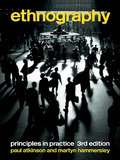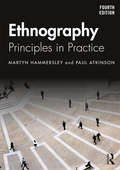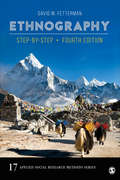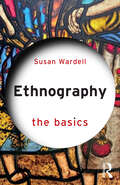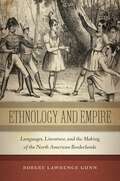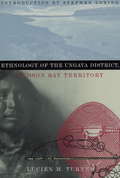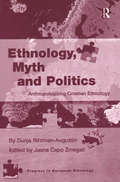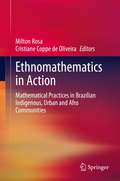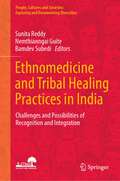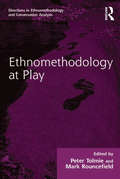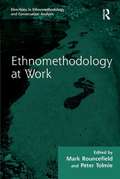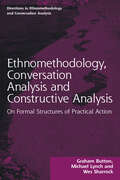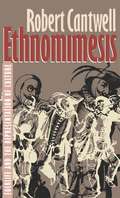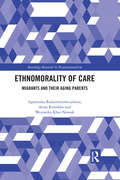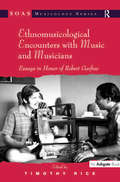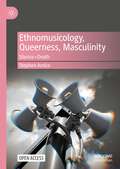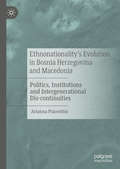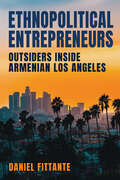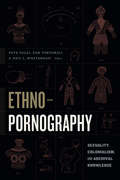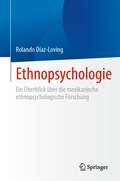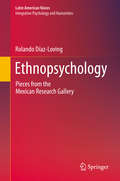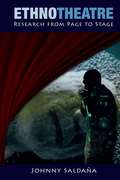- Table View
- List View
Ethnography: A Theoretically Oriented Practice
by Vincenzo Matera Angela BiscaldiThis volume presents both a historical exploration of ethnography and a thematic discussion of major trends that, over different periods, have oriented and re-oriented research practice. As it overviews ethnography from different geographic and thematic perspectives, it further explores new lines of ethnographic research, including as feminist ethnography and visual research, that uncover non-traditional routes to anthropological knowledge.As the great ethnographer E. E. Evans-Pritchard wrote, “Anyone who is not a complete idiot can do fieldwork… but will [his contribution] be to theoretical, or just to factual knowledge?” As Evans-Pritchard highlights and as this book argues, successful ethnography must be connected to a sophisticated theoretical reflection rooted in social and cultural anthropology.
Ethnography: Principles in Practice
by Paul Atkinson Martyn HammersleyNow in its third edition, this leading introduction to ethnography has been thoroughly updated and substantially rewritten. It offers a systematic introduction to ethnographic principles and practice. New material covers the use of visual and virtual research methods, hypermedia software and the issue of ethical regulation. There is also a new prologue and epilogue. The authors argue that ethnography is best understood as a reflexive process. What this means is that we must recognize that social research is part of the world that it studies. From an outline of the principle of reflexivity the authors go on to discuss and exemplify main features of ethnographic work, including: the selection and sampling of cases the problems of access observation and interviewing recording and filing data the process of data analysis and writing research reports. Throughout, the discussion draws on a wide range of illustrative material from classic and more recent studies within a global context. The new edition of this popular textbook will be an indispensable resource for students and researchers utilizing social research methods in the social sciences and cultural studies.
Ethnography: Principles in Practice
by Paul Atkinson Martyn HammersleyNow in its fourth edition, this leading introduction to ethnography has been thoroughly updated and substantially rewritten. The volume offers a systematic introduction to ethnographic principles and practice, and includes a new chapter on ‘Ethnography in the digital world’. The authors argue that ethnography is best understood as a reflexive process. This requires recognition that social research is part of the world that it studies, and demands that researchers reflect on how they shape both data and analysis. Starting in Chapter 1 with an outline of the principle of reflexivity, against the background of competing research philosophies, the authors go on to discuss the main features of ethnographic work, including: the selection and sampling of cases the problem of access field relations and observation interviewing the use of documents recording and organizing data the process of data analysis and writing research reports. There is also consideration of the ethical issues involved in ethnographic research. Throughout, the discussion draws on a wide range of illustrative material from classic and more recent studies, within a global context. The new edition of this popular textbook will be an indispensable resource for undergraduate and postgraduate students, and for all researchers using ethnographic methods in the social sciences and the humanities.
Ethnography: Step-by-Step (3rd Edition) (Applied Social Research Methods Series #Vol. 17)
by David Fetterman"Emphasis on the use of theory as a guide is excellent and cannot be stressed enough among students . . . . Ethical standards are comprehensively addressed. Any doubts the reader may have had are dispelled by the author's compelling arguments and illustrative examples."—Patricia I. Documét, University of Pittsburgh"The text has included most topics that I cover in my seminar with doctoral students and some that believe they will find helpful. One of those items an actual approach to writing a research proposal and distinctions between action research, policy research, and investigatory kinds of explorations."—Barbara K. Curry, University of DelawareThe Third Edition of Ethnography: Step-by-Step guides readers in collecting and making sense of large amounts of ethnographic data. It also offers current discussion about the use of technology in the pursuit of ethnography. Fundamentally, however, it demonstrates how ethnography is more than a methodological approach. For David M. Fetterman, ethnography is a way of life.
Ethnography: Step-by-Step (Applied Social Research Methods #17)
by David FettermanDavid M. Fetterman captures the ethnographic imagination with the Fourth Edition of his popular text, Ethnography: Step-by-Step. He shares new case examples of his work to highlight the illuminating power of reflexivity and theory. The new edition expands the discussion of critical concepts such as culture, contextualization, emic and etic distinctions, and symbols. The book provides insights into the use of technology in ethnography from qualitative data analysis software to data visualization, and Questions for Reflection have been added to the end of each chapter. Fetterman is a seasoned educator, evidenced by both the clarity of his thinking and the simplicity of his writing.
Ethnography: Step-by-Step (Applied Social Research Methods #17)
by David FettermanDavid M. Fetterman captures the ethnographic imagination with the Fourth Edition of his popular text, Ethnography: Step-by-Step. He shares new case examples of his work to highlight the illuminating power of reflexivity and theory. The new edition expands the discussion of critical concepts such as culture, contextualization, emic and etic distinctions, and symbols. The book provides insights into the use of technology in ethnography from qualitative data analysis software to data visualization, and Questions for Reflection have been added to the end of each chapter. Fetterman is a seasoned educator, evidenced by both the clarity of his thinking and the simplicity of his writing.
Ethnography: The Basics (The Basics)
by Susan WardellEthnography: The Basics introduces a broad and beginner audience to ethnography as a research methodology with diverse applications. By using everyday language and developing a warm and inclusive tone, the book provides an accessible entry point to the topic.It offers a picture of the practice of ethnography that is both human and humane, tackling some of the practical barriers, ethical complexities, and lived experiences in an honest and straightforward way. Organised into eight chapters, the book provides a comprehensive overview of the unique purpose, value, and scope of ethnography, as well as a practical guide as to what the practice of ethnographic research involves, such as steps for designing research, gathering data, and analysing and presenting findings.Without relying on assumed familiarity with or interest in discipline-specific histories and frameworks, Ethnography: The Basics combines clear structure, plain language, and thoughtfully selected examples and stories to welcome students into this interesting and valuable subject. The book will also be of great interest to academics and professionals who wish to supplement their ethnographic knowledge.
Ethnology and Empire: Languages, Literature, and the Making of the North American Borderlands (America and the Long 19th Century #6)
by Robert Lawrence GunnWinner, The Early American Literature Book PrizeEthnology and Empire tells stories about words and ideas, and ideas aboutwords that developed in concert with shifting conceptions about Native peoplesand western spaces in the nineteenth-century United States. Contextualizing theemergence of Native American linguistics as both a professionalized researchdiscipline and as popular literary concern of American culture prior to theU.S.-Mexico War, Robert Lawrence Gunn reveals the manner inwhich relays between the developing research practices of ethnology, works offiction, autobiography, travel narratives, Native oratory, and sign languagesgave imaginative shape to imperial activity in the western borderlands. In literary andperformative settings that range from the U.S./Mexico borderlands to the GreatLakes region of Tecumseh’s Pan-Indian Confederacy and the hallowed halls oflearned societies in New York and Philadelphia, Ethnology and Empire modelsan interdisciplinary approach to networks of peoples, spaces, and communicationpractices that transformed the boundaries of U.S. empire through atransnational and scientific archive. Emphasizing the culturally transformativeimpacts western expansionism and Indian Removal, Ethnology and Empire reimaginesU.S. literary and cultural production for future conceptions of hemisphericAmerican literatures.
Ethnology of the Ungava District, Hudson Bay Territory
by Lucien M. Turner Stephen LoringLucien Turner arrived at the present-day community of Kuujjuaq on the northern Quebec-Labrador peninsula in 1882. As with his earlier long-term appointments in Alaska, he primarily conducted meteorological, atmospheric, and tidal observations for the U.S. Army's Signal Corps. But he also developed a meaningful rapport with the Innu and Inuit, spending his free time studying and recording not only their material culture--including clothing, dwellings, weapons, and tools--but also their lifeways, language, and stories. His images of these people and their camps are among the earliest examples of photography of the Arctic. As Stephen Loring Notes in the introduction, "With few exceptions--Inuit shamanistic paraphernalia and Innu hunting charms--the majority of the materials Turner collected were artifacts and clothing used in day-to-day activities. The passage of time and the miracle of conservation have transformed these ethnographic minutiae, these objects and materials of relatively minor significance on the past, into treasured cultural icons." Especially notable for Lucien Turner's descriptions of nineteenth-century Native material culture, Ethnology of the Ungava District, Hudson Bay Territory was originally published in 1894 as part of the Smithsonian's Annual Report of the Bureau of American Ethnology series--often considered to mark the beginning of American anthropological studies. This reissue ensures that Turner's work continues to be a classic introduction to the culture of the Innu and Inuit people of northern Quebec and Labrador.
Ethnology, Myth and Politics: Anthropologizing Croatian Ethnology (Progress in European Ethnology)
by Dunja Rihtman-Augustin Jasna Capo ZmegacThe book offers a critical overview of Croatian ethnology written by the most prominent Croatian ethnologist/ anthropologist in the second half of the 20th century - Dunja Rihtman-Augustin (recently deceased). She was the first Croatian ethnologist to break with the long established tradition of diffusionist (culture area) studies of her contemporaries and start to anthropologize Croatian ethnology. This book, compiled and completed by Jasna Capo Zmegac, highlights some crucial remarks with regard to the relationship between ethnology and politics. They are formulated as a series of research questions and problems, including: the role of folk culture as mythomoteur, cannonization of the folk culture, nationalization of the peasants in the 19th century and the role of ethnology. This vividly written text offers an exceptional insight into Croatian ethnological developments in the past century, as well as into crucial ruptures in Croatian society which have had important repercussions on ethnological discipline.
Ethnomathematics in Action: Mathematical Practices in Brazilian Indigenous, Urban and Afro Communities
by Milton Rosa Cristiane Coppe de OliveiraThis book presents a collection of ethnomathematical studies of diverse mathematical practices in Afro-Brazilian, indigenous, rural and urban communities in Brazil. Ethnomathematics as a research program aims to investigate the interrelationships of local mathematical knowledge sources with broader universal forms of mathematics to understand ideas, procedures, and practices found in distinct cultural groups. Based on this approach, the studies brought together in this volume show how this research program is applied and practiced in a culturally diverse country such as Brazil, where African, indigenous and European cultures have generated different forms of mathematical practice. These studies present ethnomathematics in action, as a tool to connect the study of mathematics with the students’ real life experiences, foster critical thinking and develop a mathematics curriculum which incorporates contributions from different cultural groups to enrich mathematical knowledge. By doing so, this volume shows how ethnomathematics can contribute in practice to the development of a decolonial mathematics education. Ethnomathematics in Action: Mathematical Practices in Brazilian Indigenous, Urban and Afro Communities will be of interest to educators and educational researchers looking for innovative approaches to develop a more inclusive, democratic, critical, multicultural and multiethnic mathematics education.
Ethnomedicine and Tribal Healing Practices in India: Challenges and Possibilities of Recognition and Integration (People, Cultures and Societies: Exploring and Documenting Diversities)
by Sunita Reddy Nemthianngai Guite Bamdev SubediThis book examines various aspects of ethnomedicine and tribal healing practices, including its importance for inclusion and integration from a health systems perspective. Tribal healing practices is an under-studied component in healthcare system, health policy and health systems research. The book consists of original research papers based on empirical studies done by anthropologists, sociologists, public health practitioners and research scientists in various parts of India. It discusses issues of non-codified folk healing, with a focus on the therapeutic ideas and practices of tribal communities, located in anthropological theory and methods. It has a balance of empirical papers, review and theoretical papers, not only explaining ‘what is inside the healing practices’ but also touching upon the question of ‘why’ and delving into ‘what should be’ looking into the possibility to apply it for a larger good i.e., health care for all. This book discusses several important issues related to legitimacy, evidence and efficacy, recognition, certification and integration, protection and preservation, bio-piracy and bioprospecting, benefit sharing and intellectual property rights, sustainable use of medicinal herbs and conservation of nature and natural resources, biodiversity and possibilities of mainstreaming tribal healing. It is of interest to students and researchers from medical anthropology, medical sociology, cultural geography, liberal studies, tribal studies, ecology, sustainability and development and public health.
Ethnomethodology at Play (Directions in Ethnomethodology and Conversation Analysis)
by Peter Tolmie Mark RouncefieldThis book outlines the specific character of the ethnomethodological approach to 'play'; that is, to everyday sport and leisure activities that people generally engage in for enjoyment, at home or as a 'hobby'. With chapters on cooking, running, playing music, dancing, rock climbing, sailing, fly fishing and going out for the day as a family, Ethnomethodology at Play provides an introduction to the key conceptual resources drawn upon by ethnomethodology in its studies of these activities, whilst exploring the manner in which people 'work' at their everyday leisure. Demonstrating the breadth of ethnomethodological analysis and showing how no topic is beyond ethnomethodology's fundamental respecification, Ethnomethodology at Play sets out for the serious reader and researcher the precise contribution of ethnomethodology to sociological studies of sport and leisure and ordinary domestic pastimes. As such this groundbreaking volume constitutes a significant contribution to both ethnomethodology and sociology in general, as well as to the sociology of sport and leisure, the sociology of domestic and daily life and cultural studies.
Ethnomethodology at Work (Directions in Ethnomethodology and Conversation Analysis)
by Peter Tolmie Mark RouncefieldBringing together one of the most important bodies of research into people's working practices, this volume outlines the specific character of the ethnomethodological approach to work, providing an introduction to the key conceptual resources ethnomethodology has drawn upon in its studies, and a set of substantive chapters that examine how people work from a foundational perspective. With contributions from leading experts in the field, including Graham Button, John Hughes and Wes Sharrock, Ethnomethodology at Work explores the contribution that ethnomethodological studies continue to make to our understanding of the ways in which people actually accomplish work from day to day. As such, it will appeal not only to those working in the areas of ethnomethodology and conversation analysis, but also to those with interests in the sociology of work and organisations.
Ethnomethodology, Conversation Analysis and Constructive Analysis: On Formal Structures of Practical Action (Directions in Ethnomethodology and Conversation Analysis)
by Michael Lynch Wes Sharrock Graham ButtonThis book revisits the arguments by which Harvey Sacks and Harold Garfinkel opposed the widespread attempt in the social sciences to construct disciplinary theories and methods in place of common-sense knowledge of human action, and proposed instead an alternative that would investigate the organised methods of natural language use and common-sense reasoning that constitute social orders – arguments that led to the establishment and proliferation of ethnomethodology and conversation analysis. As the very "constructive analysis" that they opposed has begun to be incorporated into influential lines of research in ethnomethodology and conversation analysis, the authors return to the founding insights of the field and reiterate the importance of Garfinkel and Sacks’ original and controversial proposals for an "alternate" sociology of practical action and practical reasoning. Showing how constructive analysis has become entrenched in ethnomethodology and conversation analysis and arguing for a need to "re-boot" these approaches, this volume constitutes a call for a renewal of the radical alternative proposed by Garfinkel and Sacks.
Ethnomimesis
by Robert S. CantwellWide-ranging and provocative, this book will fascinate all those intrigued by how we create and perpetuate our representations of folklife and culture. Ethnomimesis is Robert Cantwell's word for the process by which we take cultural influences, traditions, and practices to ourselves and then manifest them to others. Ethnomimesis is an element of ordinary social communication, but springing out of it, too, is that extraordinary summoning up that produces our literature, our art, and our music. In the broadest sense, ethnomimesis is the representation of culture. Using such diverse cultural artifacts as King Lear and an eighteenth-century English manor garden to deepen our understanding of ethnomimesis, Cantwell then explores at length the representation of culture in our national museum, the Smithsonian, focusing especially on the Festival of American Folklife. Like many other such exhibitions, the Festival enacts presentations of culture across the boundaries of rank and class, race and ethnicity, gender and the life cycle. Like the concept of 'folklife' itself, Cantwell argues, the Festival stands where ethnomimesis finds its creative source, at the cultural frontier between self and other. That boundary, and the energy that accumulates there, runs through the many, varied 'exhibits' of this book.
Ethnomorality of Care: Migrants and their Aging Parents (Routledge Research in Transnationalism)
by Agnieszka Radziwinowiczówna Anna Rosińska Weronika Kloc-NowakWhat happens when the parents of migrants age and need care in mobile and aging societies? Ethnomorality of Care acts as a window in sharing how physical distance challenges family-centered elderly care by juxtaposing transnational families with non-migrant families. <P><P>A novel approach that explores intentions and moral beliefs concerning elderly care alongside practical care arrangements, Ethnomorality of Care presents a concept of care which recognizes how various factors shape the experience of care, including: national, regional, and local contexts, economic inequalities, gender, care and migration regimes. Based on the findings of a multi-sited research carried out between 2014 and 2017 in Poland and the UK, this perceptive volume also seeks to demonstrate how researchers and practitioners can use ethnomorality of care approach to examine non-migrant families and other types of care. <P><P>Helping readers to better understand the lived experience of care receivers and givers beyond kinship care, Ethnomorality of Care will appeal to graduate students, researchers, policy makers and care practitioners interested in fields such as migration studies, transnational studies and social and cultural gerontology.
Ethnomusicological Encounters with Music and Musicians: Essays in Honor of Robert Garfias (Soas Studies In Music Ser.)
by Timothy RiceDesigned as a tribute to Robert Garfias, who has conducted field work in more cultures than any other living ethnomusicologist, this volume explores the originating encounter in field work of ethnomusicologists with the musicians and musical traditions they study. The nineteen contributors provide case studies from nearly every corner of the world, including biographies of important musicians from the Philippines, Turkey, Lapland, and Korea; interviews with, and reports of learning from, musicians from Ireland, Bulgaria, Burma, and India; and analyses of how traditional musicians adapt to the encounter with modernity in Japan, India, China, Turkey, Afghanistan, Morocco, and the United States. The book also provides a window into the history of ethnomusicology since all the contributors have had a relationship with the University of Washington, home to one of the oldest programs in ethnomusicology in the United States. Inspired by the example of Robert Garfias, they are all indefatigable field researchers and among the leading authorities in the world on their particular musical cultures. The contributions illustrate the core similarities in their approach to the discipline of ethnomusicology and at the same time deal with a remarkably wide range of perspectives, themes, issues, and theoretical questions. Readers should find this collection of essays a fascinating, indeed surprising, glimpse into an important aspect of the history of ethnomusicology.
Ethnomusicology, Queerness, Masculinity: Silence=Death
by Stephen AmicoThis open access book explores the disciplinary, disciplined, and recent interdisciplinary sites and productions of ethnomusicology and queerness, arguing that both academic realms are founded upon a destructive masculinity—indissolubly linked to coloniality and epistemic hegemony—and marked by a monologic, ethnocentric silencing of embodied, same-sex desire. Ethnomusicology’s fetishization of masculinizing fieldwork; queerness’s functioning as Anglophone master category; and both domains’ devaluation of sensuality and experience, concomitant with an adherence to provincial, Western conceptions of knowledge production, are revealed as precluding the possibilities for equitable, dialogic pluriversality. Enlisting the sonic as theoretical intervention, the disciplined/disciplining ethno and queer are reimagined in relation to negative emotions and intractable affect, ultimately vanquished, and replaced by explorations of sound, sex/uality, and experiential somaticity within a protean, postdisciplinary space of material/epistemic equity. This uncompromising, long-overdue critique will be of interest to researchers and students from numerous theoretical backgrounds, including music, sound, gender, queer, and postcolonial/decolonial studies.
Ethnonationality’s Evolution in Bosnia Herzegovina and Macedonia: Politics, Institutions and Intergenerational Dis-continuities
by Arianna PiacentiniThis book is centred upon the concept of ‘ethnonationality,’ investigating how its meanings and functions have changed across political regimes, time, and generations. Piacentini explores two similar yet different realities, Bosnia Herzegovina and Macedonia (now North Macedonia) – both former Yugoslav republics, multiethnic, and currently characterised by consociational arrangements and ethnic politics. This temporal perspective encompasses both the Yugoslav and post-Yugoslav period, empirically exploring two generations living together in the same family, each socialised by different macro-environments and socio-political and economic conditions. The book explores which ideas, rules, and patterns of behaviour related to ethnonationality have been transmitted between the generations. Ethnonationality’s Evolution in Bosnia Herzegovina and Macedonia will be of interest to students and scholars across a range of disciplines, including sociology, politics, and conflict studies.
Ethnopolitical Entrepreneurs: Outsiders inside Armenian Los Angeles
by Daniel FittanteEthnopolitical Entrepreneurs presents the story of the Armenians of Glendale, California. Coming from Argentina, Armenia, Egypt, Iran, Jordan, Lebanon, Russia, Syria, and many other countries, this group is internally fragmented and often has limited experience with the American political system. Nonetheless, Glendale's Armenians have rapidly mobilized and remade an American suburban space in their own likeness. In telling their story, Daniel Fittante expands our understanding of US political history. From the late nineteenth-century onward, Irish, Italian, Jewish, and several other immigrant populations in large American cities began changing the country's political reality. The author shows how Glendale's Armenians—as well as many other immigrants—are now changing the country's political reality within its dynamic, multiethnic suburbs. The processes look different in various suburban contexts, but the underlying narrative holds: immigrant populations converge on suburban areas and ambitious political actors develop careers by driving coethnics' political incorporation.
Ethnopornography: Sexuality, Colonialism, and Archival Knowledge
by Neil L. Whitehead Pete Sigal Zeb TortoriciThis volume's contributors explore the links among sexuality, ethnography, race, and colonial rule through an examination of ethnopornography—the eroticized observation of the Other for supposedly scientific or academic purposes. With topics that span the sixteenth century to the present in Latin America, the United States, Australia, the Middle East, and West Africa, the contributors show how ethnopornography is fundamental to the creation of race and colonialism as well as archival and ethnographic knowledge. Among other topics, they analyze eighteenth-century European travelogues, photography and the sexualization of African and African American women, representations of sodomy throughout the Ottoman empire, racialized representations in a Brazilian gay pornographic magazine, colonial desire in the 2007 pornographic film Gaytanamo, the relationship between sexual desire and ethnographic fieldwork in Africa and Australia, and Franciscan friars' voyeuristic accounts of indigenous people's “sinful” activities. Outlining how in the ethnopornographic encounter the reader or viewer imagines direct contact with the Other from a distance, the contributors trace ethnopornography's role in creating racial categories and its grounding in the relationship between colonialism and the erotic gaze. In so doing, they theorize ethnography as a form of pornography that is both motivated by the desire to render knowable the Other and invested with institutional power.Contributors. Joseph A. Boone, Pernille Ipsen, Sidra Lawrence, Beatrix McBride, Mireille Miller-Young, Bryan Pitts, Helen Pringle, Pete Sigal, Zeb Tortorici, Neil L. Whitehead
Ethnopsychologie: Ein Überblick über die mexikanische ethnopsychologische Forschung
by Rolando Díaz-LovingDieses Buch gibt einen Überblick über die mexikanische Ethnopsychologie, einen originellen theoretischen und methodischen Ansatz, der darauf abzielt, die auf universellen Prinzipien, Prozessen und Konstrukten basierende psychologische Wissenschaft durch wissenschaftliche Methoden zu ergänzen, um die für bestimmte kulturelle Gruppen typischen idiosynkratischen Merkmale und Verhaltensweisen zu untersuchen. Sie schlägt ein historisch-bio-psycho-sozio-kulturelles theoretisches Modell vor, um Forschungsergebnisse zu sozialen, psychologischen, kollektiven und individuellen Phänomenen zu beschreiben.Die Psychologie steht am Scheideweg einer jahrelangen Forschung, bei der der Schwerpunkt auf der internen Validität lag und kontextuelle und kulturelle Variablen kaum beachtet wurden. Es ist von grundlegender Bedeutung, den Weg der internen Validität weiterzuverfolgen und gleichzeitig Fragen der externen Validität einzubeziehen. Die Zunahme indigener Bewegungen und Daten ermöglicht eine gründliche Bewertung der Frage, inwieweit scheinbar universelle Phänomene wirklich universell sind und inwieweit sie idiosynkratische Manifestationen der Kulturen sind, in denen die Mainstream-Forschung betrieben wird.Mexikanische Ethnopsychologen verfolgen diesen Weg schon seit Jahrzehnten, seit der Pionierarbeit von Rogelio Díaz-Guerrero, aber bisher wurde nur wenig über diesen innovativen theoretischen Ansatz in englischer Sprache veröffentlicht. Ethnopsychologie - Stücke aus der mexikanischen Forschungsgalerie füllt diese Lücke, indem es der internationalen Gemeinschaft einen Überblick über die mexikanische Ethnopsychologie gibt und somit ein nützliches Instrument für Verhaltens-, Sozial- und Gesundheitswissenschaftler darstellt, die daran interessiert sind, zu verstehen, wie die Kultur sowohl kollektive als auch individuelle Verhaltensweisen prägt.
Ethnopsychology: Pieces from the Mexican Research Gallery (Latin American Voices)
by Rolando Díaz-LovingThis book presents an overview of Mexican ethnopsychology, an original theoretical and methodological approach that seeks to complement the mainstream psychological science – based on universal principles, processes and constructs – with scientific methods to study the idiosyncratic features and behaviors typical of specific cultural groups. It proposes a historic-bio-psycho-socio-cultural theoretical model to describe research findings of social, psychological, collective and individual phenomena. Psychology is at a crossroads of years of research with stress on internal validity and little attention to contextual and cultural variables. It becomes fundamental to continue on the internal validity track but at the same time incorporate external validity issues. The growth of indigenous movements and data allows for a profound evaluation of the extents to which apparent universal phenomena are truly universal, and to what extent they are idiosyncratic manifestations of the cultures where the mainstream research is conducted. Mexican ethnopsychologists have been following this path for decades, since the pioneer work of Rogelio Díaz-Guerrero, but until now little has been published in English about this innovative theoretical approach. Ethnopsychology – Pieces from the Mexican Research Gallery fills this gap by presenting the international community an overview of Mexican ethnopsychology and thus providing a useful tool to behavioral, social and health scientists interested in understanding how culture shapes both collective and individual behaviors.
Ethnotheatre: Research from Page to Stage (ISSN)
by Johnny SaldañaEthnotheatre transforms research about human experiences into a dramatic presentation for an audience. Johnny Saldaña, one of the best-known practitioners of this research tradition, outlines the key principles and practices of ethnotheatre in this clear, concise volume. He covers the preparation of a dramatic presentation from the research and writing stages to the elements of stage production. Saldaña nurtures playwrights through adaptation and stage exercises, and delves into the complex ethical questions of turning the personal into theatre. Throughout, he emphasizes the vital importance of creating good theatre as well as good research for impact on an audience and performers. The volume includes multiple scenes from contemporary ethnodramas plus two complete play scripts as exemplars of the genre.

